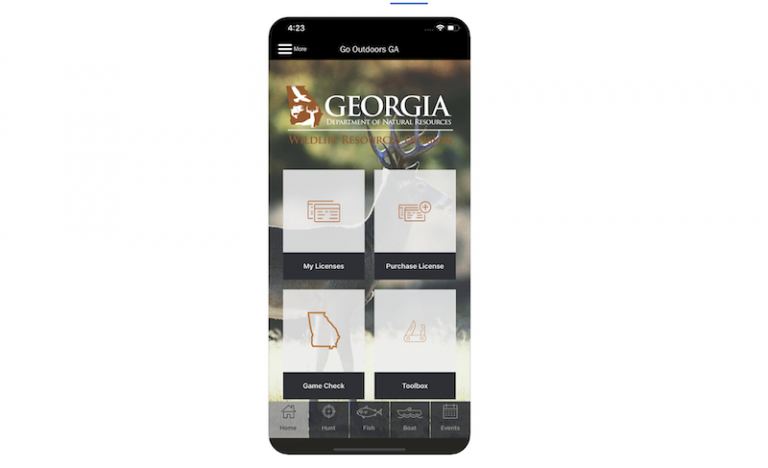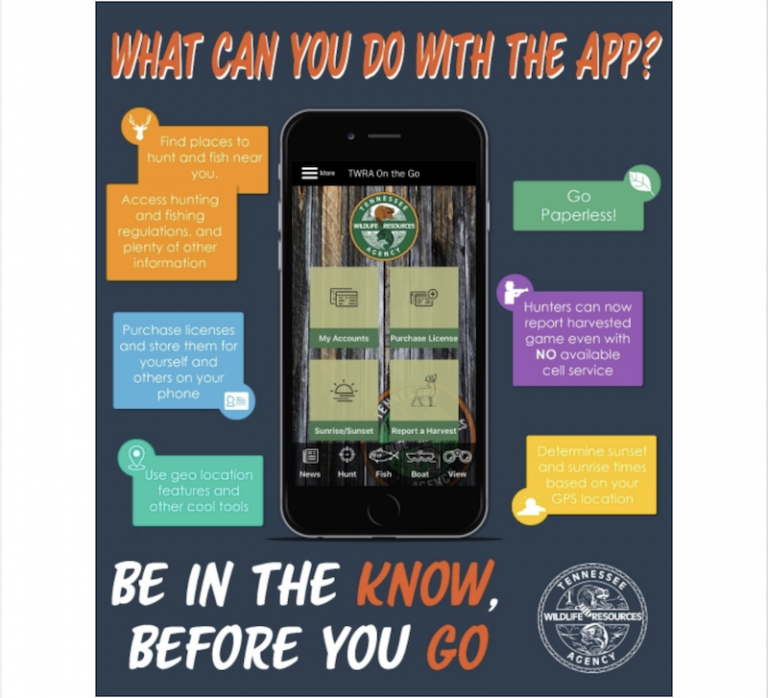Apps are the future for state agencies, and they give customers a lot of power.
Wise said the app can be customized to meet a state agency’s regulations and requirements – regardless of where they are on the go. Potential and current app features allow users to:
- Purchase licenses with a few clicks
- Auto-renew license purchases
- Store and view licenses without cell service
- Report harvested game without cell service
- Access real-time harvest reporting results
- Use geo-location features and other cool tools
- Determine sunset/sunrise times based on GPS location
- Access maps to easily find places to hunt and fish
- Receive push notifications
- Save a credit card or bank account number to their file
- Make a financial donation to the state wildlife agency
- Access hunting and fishing regulations, as well as season and bag limit information
- Stay connected to state agency news and information through its social media outlets
- Round up their purchase price to include a small donation for the agency
Wise said the app is critical for customers, because it removes barriers to participation by making hunting and fishing licenses more accessible. Meanwhile, it’s also critical for state agencies, because more licenses sold means more financial contributions to improve hunting, shooting and wildlife-associated recreation.
“The majority of these agencies are self-funded, meaning they rely almost exclusively on license revenue, and it’s leveraging value to obtain federal excise tax dollars to accomplish their mission,” Wise said. “They need that one-more-license to preserve one-more-acre or create one-more-camp for kids, and we wanted to help them do that.”
Proven Results
https://youtu.be/IBmg5iJ7DUg
The TWRA made the switch to selling online in 1999 and pumped up its online efforts in 2017 by creating a mobile friendly site. It started offering the app in 2014 and made a huge upgrade in 2018. Wisniewski said it was a slow, painful process, but they did it to please hunters and anglers, especially the younger generation. So far, it’s paid off. More than 75% of hunting and fishing licenses sold in Tennessee are obtained online using a computer or mobile device.
“If I told a 20-year-old they had to go to a store to purchase a license, I don’t know if they would,” Wisniewski said. “If they can’t get it online, then it doesn’t exist. The system overhaul made it more convenient for current hunters and anglers [to get their licenses], but also made us relevant to the upcoming generations.”
The online transition helped the TWRA:
- Generate more revenue. Wisniewski said people spend more money when they buy their license online because they often make impulsive buying decisions, like upgrading to the durable collectible license card or buying hats, stickers and water bottles. In fact, the average dollar sale for each transaction increased by $5 when people buy online. The state’s license revenue increased by 15% from 2018 to 2019. Wisniewski also said more than 62,000 customers signed up to auto-renew their license sale purchase, which generates a steady revenue stream for the agency.
- Collect better data. When people fill out their own information online, Wisniewski said, they give correctaddress, phone number and other personal details. Allowing people to complete forms themselves eliminates miscommunications between customers and license agents who fill out the customer’s data over the counter or phone. The online system also links a customer’s hunter education information with their profile, which creates a more robust database.
- Fine-tune their marketing efforts. With more accurate customer data and information, TWRA staff could take a more targeted approach to their marketing and R3 efforts. The R3 movement strives to “recruit, retain and reactivate” hunters. The agency sends specific messages to customers based on their demographics and license-buying habits, which helps improve retention.
Wisniewski said there was little resistance to the online transition. Some residents voiced their desire for paper licenses, but they were among a “dwindling minority.” The agency still allows people to buy licenses through other channels, including over the phone or through a designated licensing agent. Wisniewski doesn’t foresee the agency cutting those options because it wants everyone to feel comfortable buying a license, even if that means using an old-school method. Regardless, providing online opportunities allowed the agency to grow.
“Going online was ultimately a smart transition for us,” Wisniewski said. “It allows us to make more money and boost our R3 efforts to keep more people in the outdoor industry, so it was worth the time, effort and challenges. Plus, it made our customers very happy.”
Know Your State Requirements
Forster said state agencies are headed in the right direction, but offerings still vary nationwide. He encourages ATA members and consumers to become familiar with licensing requirements and regulations in their state, so they can comply and encourage customers to comply. Wisniewski encourages folks to call their state agency staff for clarity if the rules are confusing or hard to find.
“If your state offers an online option, embrace it,” Forster said. “Use it, recommend it to friends and take full advantage of it, because the more you use it, the better data states can collect.”
Questions? Contact Dan Forster at (866) 266-2776, ext. 128, or danforster@archerytrade.org.



